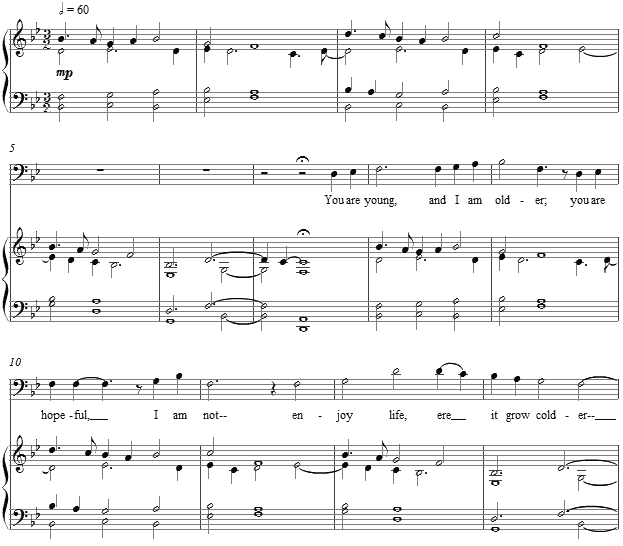Music and Texts of GARY BACHLUND
Vocal Music | Piano | Organ | Chamber Music | Orchestral | Articles and Commentary | Poems and Stories | Miscellany | FAQs
To Rosa - (2008)
Abraham Lincoln
for baritone and piano
You are young, and I am older;
You are hopeful, I am not --
Enjoy life, ere it grow colder --
Pluck the roses ere they rot.
Teach your beau to heed the lay --
That sunshine soon is lost in shade --
That now's as good as any day --
To take thee, Rosa, ere she fade.[ 2 pages, circa 1' 45" ]
Abraham Lincoln
Abraham Lincoln (1809 –1865) was the sixteenth President of the United States, during the war between the states which preserved the Union, only to be assassinated as the war was coming to an end. The first Republican elected to the office of President of the United States, Lincoln had been a lawyer, an Illinois state legislator, a member of the United States House of Representatives. According to the Online text copyright as found at the Department of English, University of Toronto web site, "Lincoln wrote the verses in the autograph album of Rosa Haggard, daughter of the proprietor of the hotel at Winchester, Illinois, where he stayed when speaking at that place on the same date." [ 1 ]
Written for baritone and piano, this setting evokes what some might incorrectly call "a simpler time." In fact the period leading up to the Civil War and continuing presidency of Lincoln was of far greater complexity than today's rather benign and bountiful time for most in the Western world. Even so, that Lincoln would take the time to express words such as these in rhyme shows a gentle side to the man concerned in the moment with a young lady's well being. The advice to "seize this day" is not at all misplaced, for in fact what time have we but the now in which we live, work and even dream.
The score for To Rosa is available as a free PDF download, though any major commercial performance or recording of the work is prohibited without prior arrangement with the composer. Click on the graphic below for this piano-vocal score.
NOTES
[ 1 ] The Collected Works of Abraham Lincoln, III, ed. Roy P. Basler, Marion Dolores Pratt, and Lloyd A. Dunlap (New Brunswick, N.J.: Rutgers University Press, 1953): 203.

